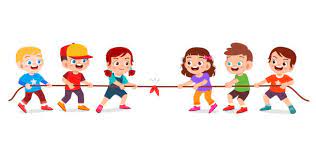Parenting is not an exact science. There is not a manual handed out in the delivery room. Most of us do what our parents did as parents. While watching a documentary on the cannibal serial killer, Jeffery Daumer, his mother was very agitated at the idea of others blaming her parenting skills for her son's actions. Did I say parenting is difficult?
We should never stop trying to improve our parenting skills, we owe it to our children. Every little insight in this endeavor of being mom and dad should be weighed for its value in helping your child to grow up happy and healthy.
In my first part of this 3-part series of birth order, I discussed the first-born child, the golden child. The middle child is neither golden nor special like the oldest and baby of the family. The middle child falls in a type of no man's land of description. They are neither precious, able, oldest, nor considered vulnerable like the youngest child of the family. Their strength is they learn to be more flexible and sociable and learn to compromise and build coalitions. Middle children tend to be more relaxed. They become skilled negotiators, social butterflies, fairness-obsessed, and peacemakers. They are Switzerland.
The MIDDLE CHILD, better described as the "iffy" child, is hard to pin down. It can be said of the middle child that they were either born too late or too early. They fall into that no man's land of not being the first-born, the star of the family, in which mom and dad lavish attention on them over the meagerest of accomplishments and the baby they cherish for just coming in last. Too late to get privileges and special treatment of the first-born and too early to benefit from the relaxed rules of discipline most of the last born enjoy.
There is not an easy list of personality traits to attach to the middle child because they are most directly influenced by the first-born child and that pattern continues to roll downhill. The third child will be influenced by the second child and so forth until you reach the last child of the family (who is a different can of worms).
The middle child looks above and sizes up the older sibling. If he or she senses he can compete with the older sibling, they may do so. But if the older sibling is stronger, smarter, etc., the second born typically shoots off in another direction, making their known personality traits difficult to nail down; thus, they are "iffy."
So, the second born may become a pleaser or an antagonize, a victim or a martyr, or a manipulator or a controller. Any of these options are up for grabs, but one thing you can be sure of is that the second born will play off of the first-born.
EXAMPLE: the first-born child may be perfectly compliant and the second born will be a handful. It is not unusual for the middle child to have more friends as a substitute family in which they find the attention they feel is lacking within the family structure. Friends become very important to middle children.
The middle child is usually the child who leaves home the quickest and is more of a free spirit giving themselves permission to reject the family's do's and don'ts at least in part. They may become mentors or even at times be manipulative. Because they could not have mom and dad all to themselves and get their way, they learn how to negotiate and compromise.
The middle child is apt to not be as religious as their parents and siblings and are less likely to be rebellious against their parents. They are trustworthy friends and work well in teams. When looking back to childhood as adults they tend to express negative views about their childhood. They are often the first to move out of the family home and move the furthest away. They are more open to taking risks and being open to new ideas.
HOW YOU AS THE MIDDLE CHILD CAN STAND YOUR GROUND
1. Middle children are the most sensitive of all the children and do not confide in many people. This can pose a problem in marriage more so than in everyday life. Learn to share your opinions and ideas with others.
2. Less likely to seek out services from helping professionals such as psychologists, counselors, or ministers (first-born engineers and doctors lead in seeking out help, followed by last-born). Don't be so tough and independent until you will not seek out what you need.
3. Running with the "pack" is fine when a choice group of people with values, morals, ethics is the criteria for your group of friends. Don't spread yourself too thin with all of your friends.
4. Middle children are the kings and queens of monogamy. Enough said. Good for you.
.
5. You are prone to embarrassment and reluctant to admit it. Everyone makes mistakes and embarrassment is part of life.
Being a middle child does have benefits. They are emotionally strong and less prone to be diagnosed with disorders like ADHD. There is nothing they can't handle. They are good marriage material. Being in the middle allows them to experience the best of both worlds. They get the wisdom of the first-born and are leaders to their younger siblings. One pulls them up and the other keeps them young. They get away with more than the older or younger children. They don't have 'helicopter parenting' like the older and younger children. They have an official Middle Child Day, August 12th, and 52% of the commanders-in-chiefs have been middle children.
I am a mother of a middle child and we, as a family, Mom, Dad, and other siblings, put forth effort from day one to ensure that our middle child did not get lost in the shuffle or get ignored. We call her "middle baby" from time to time and joke about how she is invisible and forgotten. We can joke about it because we made sure she was neither invisible nor forgotten.
So, does she have any of the "iffy" characteristics of the middle child? You bet! She is the peace maker and negotiator of the family; we call her the 'glue.' She bridges everything between everyone in the house. Did she sum up her big sis? Yes, she did. She picked up her older sister's HOBBY of drawing and became a Graphic Designer while her older sister became a doctor. They bonded (eight years difference) while drawing and it is their special thing, and the student surpassed the teacher in their case.
She hates being embarrassed on an almost psychotic level. We had to keep an eye on her when she was young because she would be too embarrassed to tell us if she fell and hurt herself. We have been working on the embarrassment issue for years. She is not a social butterfly though; her two sisters are her best friends as she gets older her circle may expand, who knows.
All in all, I believe I had a stereotypical middle child, if anything the family overcompensated for our middle baby, which I'm sure there are some ramifications for. So, I have discussed the first-born and the middle child.
The group I belong to will be discussed next: THE LAST CHILD, the bab







No comments:
Post a Comment